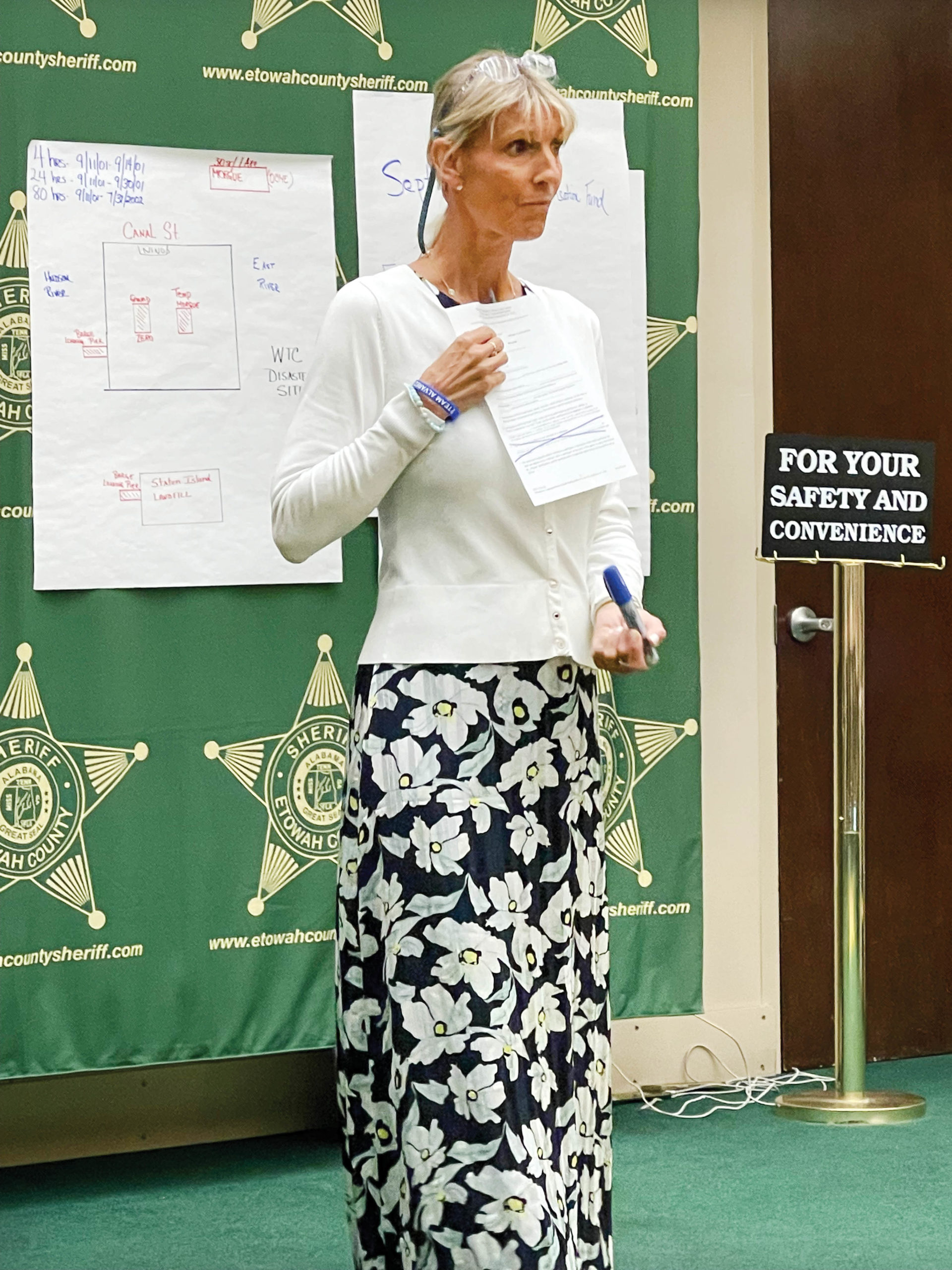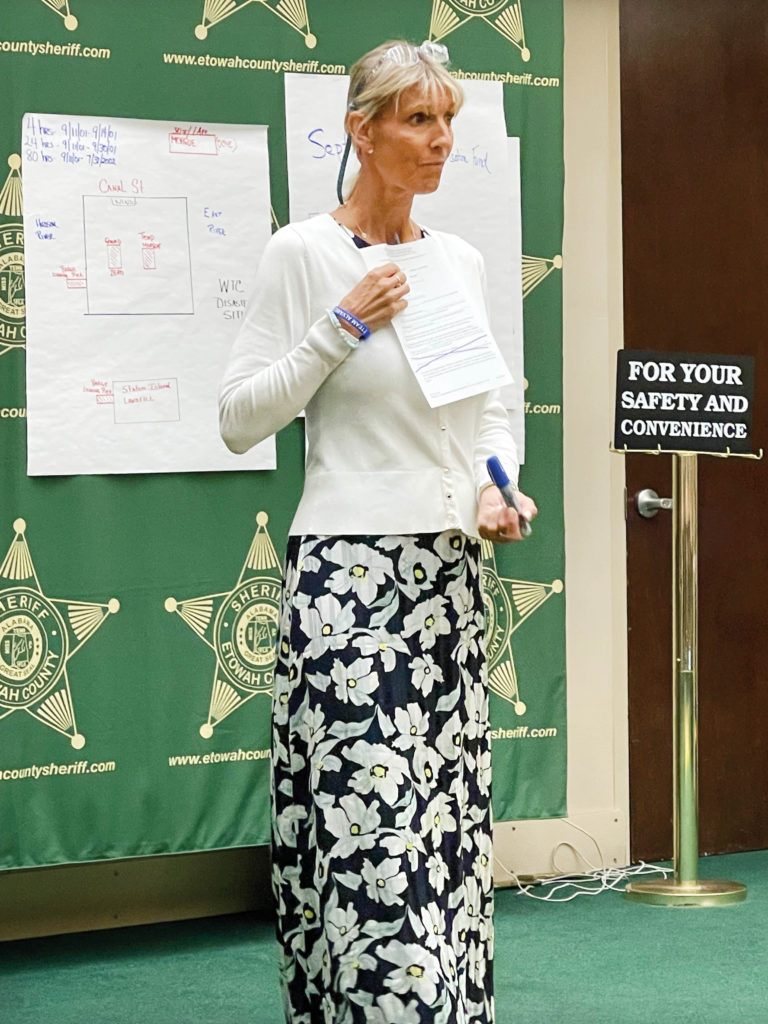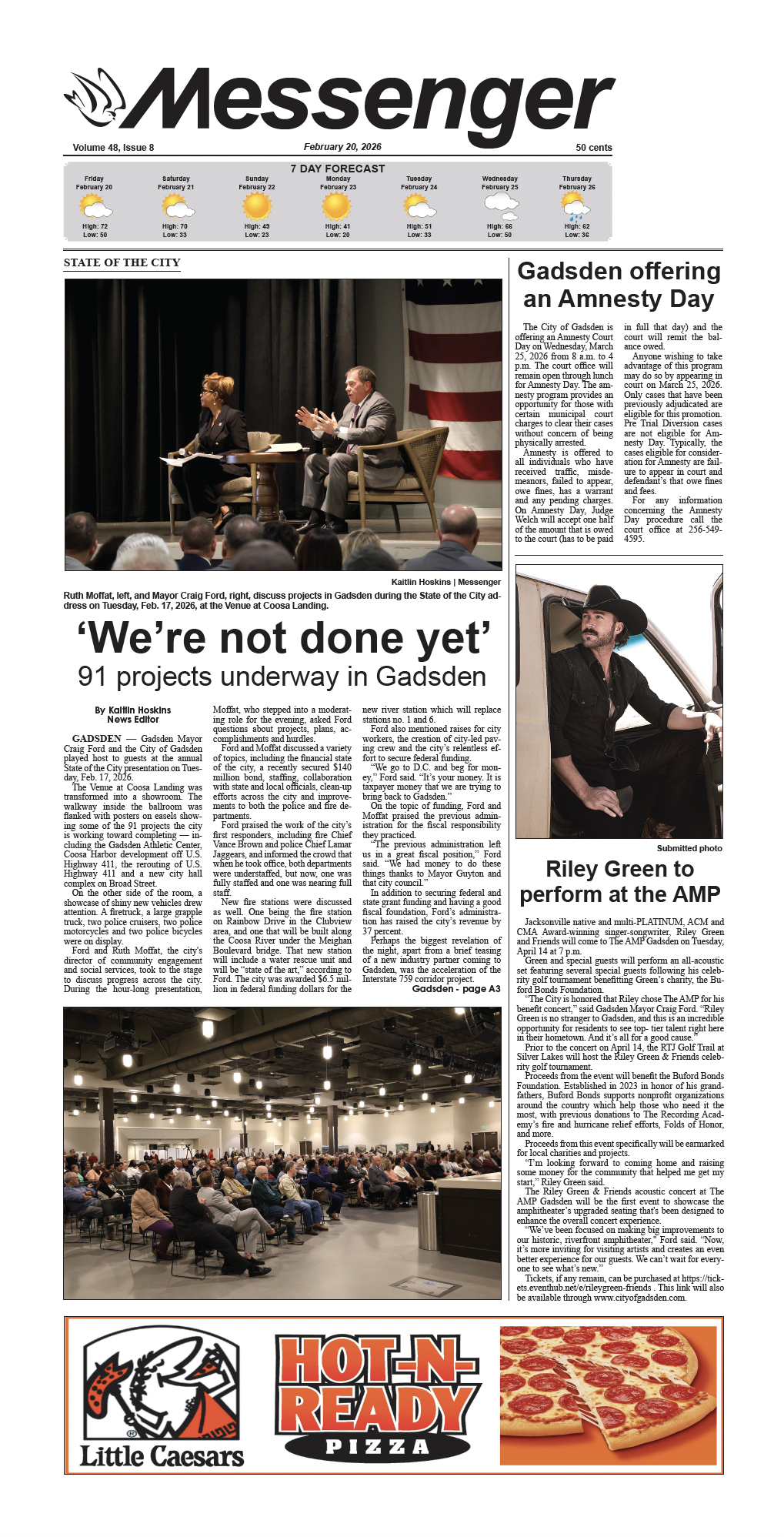Director of 9/11 Outreach & Education and retired NYPD officer Jeannie Kelly walks Etowah County 9/11 responders through registration of available programs.
By Katie Bohannon, News Editor
As the 20th anniversary of September 11, 2001 draws closer, a coalition of considerate advocates strive to ensure the men and women who responded to and survived that consequential day are never forgotten, regardless of the years that pass.
That coalition – formed of retired New York Police Department Officer and Turken, Heath & McCauley, LLP Director of 9/11 Outreach and Education Jeannie Kelly, along with Jodie Lee, Bill Miller and Richard French – traveled to the Etowah County Sheriff’s Office this past week to extend their efforts to local citizens who served their country two decades ago, joining countless volunteers to aid in relief, rescue and recovery operations.
Following the 9/11 terrorist attacks, former Etowah County Sheriff (then Chief Deputy) Todd Entrekin contacted a friend who served as a commander with the New York City Police Department, asking how they could help. In the weeks afterward, three groups representing the Sheriff’s Office, Altoona, Attalla, Hokes Bluff and Gadsden police departments and National Guard arrived in New York City.
Among those who formed the groups were Entrekin, then Chief of Investigation (and current Etowah County Commissioner) Johnny Grant, Gadsden police officer Sgt. C.A. Crisler, sheriff’s department officers (Investigator) Stephen Hooks, Woody Johnson, Kevin Hassell, Jeremy Walker, Glenn Cline, Tommy Wiggonton, Scott Cardwell, Michael Jones, Jason Rogers, Jimmie Entrekin, Donyale Richard, Danny Tilley, Tim Dail and Fred Lassiter. Attalla Police Department Deputy Chief Larry Howard, Altoona Police Department officers Robin Grant and Kevin Grant, Hokes Bluff Police Department officer Brantley Bishop and the National Guard’s Connie Grant and (current Etowah County Commissioner) Jamie Grant also assisted.
Several of these responders attended Kelly’s presentation at the Etowah County Sheriff’s Office on Friday, August 20 and Saturday August 21, via a collaboration between Sheriff Jonathon Horton, Administrative Coordinator Kelley McGinnis, Johnny Grant (who contacted local first responders), Investigator Hooks and one woman whose personal connections and passion proved instrumental in the presentation’s organization – Susan Spiker.
When Spiker’s husband, Todd, an FBI Special Agent and member of the Atlanta Evidence Response Team (ERT) responded to the Pentagon in September of 2001, he was not the only member of her family who dedicated himself to service. While Todd worked twelve hour shifts in Arlington, retrieving highly classified documents and sifting through debris for evidence, human remains and personal effects, Spiker’s brothers Johnny, Robin and Connie Grant and her nephews Jamie and Kevin Grant and Fred Lassiter performed numerous jobs at Ground Zero in New York City.
As the country endeavored to heal in 9/11’s aftermath, Spiker soon realized that the road to recovery for so many responders and survivors proved a more challenging route. Six months after Todd returned home from the Pentagon, he and Spiker found themselves at Emory University Hospital in Atlanta. The discovery of a tumor that shattered Todd’s L3 vertebrae led to his diagnosis of Stage 4 Non-Hodgkin’s lymphoma, an extremely aggressive blood cancer.
Todd underwent surgery and began chemotherapy treatments straightaway, focused on a tumor that was compressing his heart. While Todd overcame his diagnosis and his health improved, Spiker shared that he never entirely recovered – often enduring immune and GI issues throughout the years.
Despite his illnesses, Todd never allowed his health to affect his lifelong commitment to service and his family, furthering his efforts as an instrumental figure in the establishment of the FBI’s Tennessee Valley Regional Computer Forensics Lab on Redstone Arsenal in Huntsville. He retired in 2019 as a supervisory special agency and the lab’s director.
When Todd received a letter from the FBI indicating his proof of presence at a 9/11 crash site – encouraging him to register for programs implemented specifically for those affected by 9/11 – he and Spiker concluded that his health conditions, like so many others nationwide, were a direct result of his involvement.
The programs, the World Trade Center Health Program (WTCHP) and the September 11 Victim Compensation Fund (VCF), along with the NYS Workers’ Compensation Registration of Participation, are designed to support those responders and survivors who experienced a 9/11 related illness. These were discussed during Kelly’s outreach presentation that Spiker helped coordinate.
Following Todd’s own registration with WTCHP, he and Spiker were reminded of their family and friends who also responded to 9/11. Impressed to extend such beneficial knowledge to others, with experience in the complicated process, Todd and Spiker began brainstorming methods of registration.
However, while the couple were still conversing the details of presenting the programs to other responders, Todd unexpectedly passed away in April of 2021. With the loss of someone so beloved, Spiker felt a calling greater than ever before to help those, like her husband, who dedicated their time, endeavors and lives in 9/11 recovery.
“Since Todd and I knew many of the guys who responded to New York City from Etowah County, he and I had started discussing ways to help get them registered with the WTCHP,” said Spiker. “During a conversation with some of Todd’s former coworkers, we discussed how Todd’s sudden death was likely a result of his cancer treatments and subsequent complications. I told them I wanted to make sure that other responders knew about the programs, so they could be monitored.”
“They led me to Matthew McCauley and Jeannie Kelly, both retired NYPD officers, who have been tireless advocates for 9/11 first responders such as Todd. Jeannie offered to come down and present their outreach program and register each attendant in both programs, so I put her in touch with Sheriff Horton, Kelly McGinnis and Stephen Hooks and they made it happen. I am so grateful to all of them for their help, because I feel like this has allowed me to honor Todd’s memory. I know he would be pleased with the results.”
Todd’s story mirrors increasing cases across the country. In just weeks after the attacks, first responders (and survivors) began experiencing illnesses due to their exposure to the cloud of dust and soot from the collapsed and burning towers. The toxic dust they breathed contained over 2,500 contaminants, including asbestos, carbon monoxide, lead, mercury and hydrogen sulfide.
Men and women began developing disorders directly linked to 9/11 such as various types of cancer, rhinosinusitis, asthma, gastroesophageal reflux disease (GERD), sleep apnea, heart disease, posttraumatic stress disorder, depression, respiratory disease, chronic obstructive pulmonary disease and anxiety disorder.
As the number of afflicted individuals rose higher and higher, concerned citizens lobbied to elected officials to act. While the U.S. Congress established the original Victim Compensation Fund (VCF1) in 2001 to provide financial relief for those affected by 9/11, VCF1 closed in 2004. In 2011, President Barack Obama signed into law the James Zadroga 9/11 Health and Compensation Act of 2010, which modified the Public Health Service Act to improve and extend services to those impacted by 9/11.
The Zadroga Act reopened the VCF and established two other programs: The World Trade Center Health Program and The World Trade Center Health Registry. The World Trade Center Health Registry was a voluntary survey for the purpose of tracking health effects of a disaster and closed in 2004. The collected data allowed medical professionals to compare those exposed to 9/11 toxins to the health of the general population.
The World Trade Center Health Program (WTCHP) and VCF, which Kelly presented to attendants at the Etowah County Sheriff’s Office, are two different programs that operate in conjunction with one another to support affected individuals and families. Both the WTCHP and VCF possess separate registration processes and eligibility criteria.
Administered by the U.S. Department of Health and Human Services, the WTCHP is a federal program that provides monitoring and treatment for certified WTC-related illnesses. In 2015, the program was reauthorized extending its benefits to the year 2090 and in 2019, legislation increased the number of individuals who can enroll in the program. The Zadroga Act determines the administrative structure of the program, from enrollment to certification, health monitoring and treatment.
Individuals enroll in the WTCHP as either responders or survivors (those who lived, worked or attended school in the disaster area). Responders or survivors complete an application, including required supporting documentation. Supporting documentation for responders must show proof of presence at one or more of the World Trade Center sites, the Pentagon or Shanksville, Pennsylvania. Documents must include the type of work performed, address or street name of where individuals worked, the time period individuals worked at each location (dates) and how many hours per day, week or month they worked at each location.
Supporting documentation for survivors must include a home address, workplace, school, daycare center or adult daycare center along with dates of residence or attendance, proof of presence within the NYC Disaster Area and confirmation of exposure to the dust or dust cloud, proof of eligibility to receive a residential grant from Lower Manhattan Development Corporation and/or Residential Grant Program or proof from an employer receiving the grant.
The WTCHP evaluates applications to determine whether or not the provided information meets eligibility requirements. Once an individual is enrolled, the program sends that person a letter advising he or she to schedule an initial health evaluation at one of the program affiliated clinics. If the health evaluation concludes that a person might possess a WTC-related illness or condition, the health care provider will request that the program certifies the condition.
Following certification, that individual can receive treatment (from bloodwork, diagnostic testing to chemotherapy) for his or her condition from one of the program clinics, medication or medical devices, free of cost. The program covers five categories of conditions: acute traumatic injuries like burns, sprains and fractures, certain cancers, aerodigestive disorders like asthma, GERD and sleep apnea, mental health conditions like PTSD and depression and musculoskeletal disorders like carpal tunnel syndrome and low back pain. A detailed list of all covered conditions, along with more facts, are available online.
Administered by the U.S. Department of Justice, the VCF provides financial compensation for those diagnosed with an eligible 9/11 related illness, who meet the criteria. Designed to compensate for physical harm or death caused by 9/11 or the debris removal efforts following, the VCF provides a no-fault alternative to lawsuits and appropriates funds for approved claims. Registration with the VCF is not the same as filing a claim.
Financial compensation awards vary in amount and are comprised of three components: non-economic loss, economic loss and collateral offsets. Non-economic loss simply refers to the possession of an illness, while economic loss includes loss of earnings, employment benefits, Replacement Services loss and any other medical or out-of-pocket expenses. The VCF offers a death benefit should anyone pass away for the family to receive compensation from the federal government. All awards are non-taxable.
Like the WTCHP, the VCF supports responders and survivors alike and requires proof of presence documentation for eligibility. Claims cannot be processed until the VCF receives notification from the WTCHP that the individual has been certified for one or more 9/11-related conditions.
With both the WTCHP and the VCF, individuals do not have to be currently sick to register. Kelly emphasized that annual screenings with premium trained medical professionals (equipped to recognize specific 9/11-related illnesses) is based on the presumption that anyone who worked at one of the sites might become sick. Registration with the VCF, regardless of whether a person is ill or not, preserves that individual’s rights to file a claim should they develop a condition in the future.
“We’re seeing people get sick now more than ever before,” said Kelly. “A lot of people think, ‘It’s been 20 years,’ or ‘I don’t want to take away from the folks that are sick or who have passed away, I have my own insurance.’ A lot of people on the first responder side often also think, ‘I don’t want to jinx myself,’ or they live in denial. Generally, in public safety we’re not doctor people – we go to work sick, we self-medicate, we learn to live with it. This is a benefit that provides free screenings. It’s a monitoring program, so there is a way for that screening to find illnesses early on before they manifest and get worse. It’s preventative medicine.”
Kelly also aided Etowah County participants in completing the NYS Workers’ Compensation Registration of Participation Form (WTC-12) for volunteers or employees who participated in World Trade Center recovery, rescue and clean-up operations between September 11, 2001 and September 12, 2002. While registration does not equate the filing of a claim for workers’ compensation benefits, notice of participation and approval can qualify those registered for lifelong benefits from the state of New York. The deadline for the NYS form is September 11, 2022.
As Director of 9/11 Outreach and Education, Kelly travels nationwide ensuring all registrations are completed seamlessly and applicants are covered. An officer who worked at Ground Zero herself, Kelly provides insight into the available programs, offering counseling, coordinating events and advocating for her fellow first responders. She encouraged applicants to include their spouses (whom she lovingly refers to as ‘the wizard behind the curtain’) and family throughout the process, so that all parties remain informed.
Kelly assisted former NYPD officer and 9/11 first responder Luis Alvarez, who urged Congress to extend benefits for responders in 2019, while battling Stage 4 colorectal cancer and enduring 68 rounds of chemotherapy. When Alvarez sat down at Kelly’s dining room table with his wife, the first question he asked remains the most frequent inquiry Kelly receives. He asked, “If I don’t make it, and the doctors tell me there is nothing more they can do, who is going to take care of my wife and kids?”
Kelly safeguarded Alvarez’s certification through the WTCHP and the VCF to provide for his family before his death two years ago, just weeks following his testimony to Congress. He was 53 years old.
“The work I do is not work,” said Kelly. “This is very personal. We do this because we care – this is our life. We do this day-in and day-out, seven days a week, 24 hours a day. When you have people that are sick and they call you and say, ‘I have Stage 4 pancreatic cancer, can you help me?’ and it’s a Saturday afternoon, you don’t say to them, ‘No, it’s Saturday, I’m off today. Can you call me back Monday?’ If at any time I can help a loved one, a family member, a significant other, a spouse or a child, that’s what I do. The knowledge that I have and the resources available to me are a true blessing and that is not a coincidence. I am here because I’m supposed to be here. This is where God wants me to be. This is my purpose in life.”
Spiker commended Kelly’s passion and the successful collaboration between Horton, McGinnis, Grant and Hooks who made the event possible. Among those who attended, McGinnis shared that the response among Etowah County responders proved overwhelmingly positive, as the men were grateful for such an educational opportunity and the chance to spend time with one another again.
During the two-day event, those who completed their registrations event were reminded of other local responders who tended to the sites. Spiker and Kelly encouraged anyone who helped with 9/11 response at any time, officially or in a volunteer capacity, from the Pentagon, Pennsylvania to New York City, to register for the programs – regardless of current health. Both Spiker, Kelly and McGinnis extended their willingness to aid anyone interested in completing the process.
Kelly expressed interest in returning soon, with plans to develop future presentations for other neighboring agencies unfolding.
“We will always try to go above and beyond to find new opportunities to help our deputies,” said McGinnis. “When they put themselves and their families at risk on a daily basis, anything we can do to help the burden of medical cost in the future, we want to help. [To those responders] these programs are wonderful and will help you and your family.”
For more information, visit www.vcf.gov.





